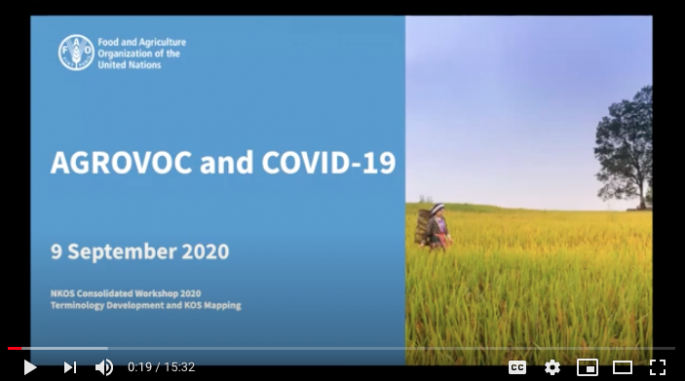Watch: AGROVOC presents work on COVID-19 in the multilingual thesaurus during NKOS 2020 workshop

During the 2020 NKOS Workshop, which was held as a virtual meeting 9-10 September 2020, the AGROVOC team presented its work on COVID-19 as part of sessions on "Terminology Development and KOS Mapping.” NKOS is devoted to the discussion of the functional and data model for enabling knowledge organization systems/services (KOS), such as classification systems, thesauri, gazetteers, and ontologies, as networked interactive information services to support the description and retrieval of diverse information resources through the Internet.
The AGROVOC presentation shared examples of issues related to multilingual AGROVOC terminology development, using COVID-19 related concepts as an example. This session presented challenges along with the decision-making process, as well as how the multilingual preferred terms are selected. The recording is available to view below:
The Coronavirus Disease 2019 pandemic is a global health crisis, and FAO is playing a role in assessing and responding to its potential impacts on people’s lives and livelihoods, global food trade, markets, food supply chains and livestock. Data-driven decision making is essential to drive further research, support ongoing investigations and share critical knowledge. Controlled vocabularies like AGROVOC play an important role in ensuring that data and research are accessible, across many languages.
Following a request from the International Food Policy Research Institute (IFPRI) for more specific terminology on COVID-19, the AGROVOC team in the Food and Agriculture Organization of the United Nations (FAO) added 25 new concepts related to the current world health crisis as an extra release on 10 April 2020. These included entries for coronavirus disease (alternative term COVID-19) and severe acute respiratory syndrome coronavirus 2 (alternative SARS-Cov-2). Other concepts were added such as MERS, SARS, movement restrictions, physical distancing, non-pharmaceutical interventions, border closures and supply chain disruptions.
The official WHO names are used for AGROVOC labels, but COVID-19 is now more used in many languages, therefore AGROVOC now lists COVID-19 as the preferred term in English, while coronavirus disease 2019 is the alternative term. Viruses are named by the International Committee on Taxonomy of Viruses (ICTV). Authoritative sources used for concepts, definitions and translations included World Health Organization (WHO) websites, FAO website and FAOTERM, the UNBIS Thesaurus, EuroVoc and Inter-Active Terminology for Europe (IATE). National editors were encouraged to use trusted sources, like national ministries of health. As of September 2020, the lexical labels for the concept COVID-19 are available in 25 languages.
Adding concepts related to COVID-19 is helpful for those cataloguing, especially as there is a plethora of research being done at the same time on the same topic. The keywords are also used for aligning datasets. Definitions of concepts are essential for shared understanding and reducing ambiguity. The vocabulary used must be understood by everyone, and it is important that consistent terminology is used.
The full socio-economic impact of the virus on food security and agricultural food systems is not yet known, therefore the number of COVID-19 related concepts in AGROVOC are still expanding. The AGROVOC monthly releases facilitate responsiveness on emerging topics. First, however, agreed terminology with definitions is needed, especially to enable correct translations.
More about the NKOS Workshop
The NKOS Workshop focused on health and medical as well as overall knowledge organization systems on the following themes:
• COVID Crisis and KOS. Facing the world-wide health crisis with vocabulary control and standards such as medical classifications to support epidemiology, public health, and healthcare domains.
• KOS Development and Use. Assembling ontologies and classifications as linked data for discovery, analysis, and collaboration.
• KOS Relationships and Mapping. Encoding concepts and relationships as the basis for reasoning rules, for example to enable language and concept switching, vocabulary mapping, linked data, multilingual retrieval, annotation, and enrichment.
• KOS Ethics. Unintended consequences of establishing and promulgating culture-bound classifications and vocabularies as standards for organizing and accessing content collections.
More about AGROVOC
AGROVOC is a multilingual thesaurus, coordinated by FAO, and maintained by an international community of experts and institutions active in the area of agriculture, fisheries, forestry and related domains. AGROVOC is available as an SKOS concept scheme, also published as a Linked Data set composed of +37,500 concepts available in up to 40 languages. By means of Linked Data, AGROVOC is aligned to other open datasets related to agriculture and the environment. Once thesauri are linked, the resources they index are linked as well.

